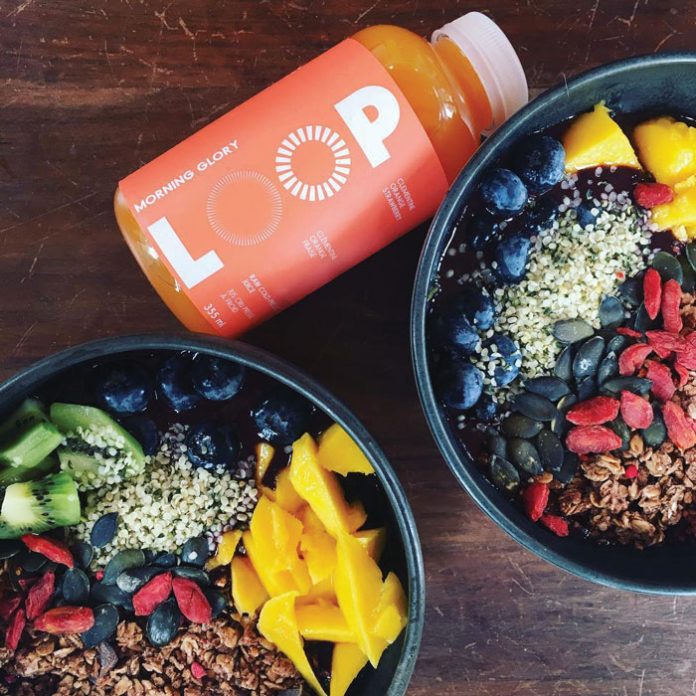Rescuing the earth, one grapefruit at a time.
By DC Rutherford
Not too long ago, LOOP Mission co-founder David Côté got a phone call from an associate in Nevada. A contact there had twenty-six vans full of organic grapefruit he was having problems giving away. He needed someone to take the fruit off his hands. “Do you want it?” he asked. “Hell yeah,” replied Côté, for whom this type of conversation is not uncommon. He is, you see, a food waste superhero.

In 2016 Côté and his partner, Julie Poitras-Saulnier, saw an epic problem: food waste. In fact, the two realized that one-third of food globally is wasted, and 79% of that comes from the food industry itself. As an example, Courchesne Larose, a major produce distributor in Eastern Canada and a veteran of over 100 years of experience in the industry, was discarding over 16 tons of produce every day – fruits and vegetables that were still good for consumption, but thrown away due to shelf-life issues or aesthetics such as look, size, and shape. Where the industry saw waste, Côté and Poitras-Saulnier saw a business opportunity. And LOOP Mission was born.

The Montreal-based circular-economy project aspires to reduce food waste by repurposing the outcasts of the food industry, says Côté. The inspired product line, he explains, includes cold-pressed juices, sour beers made with day-old bread, a gin made with potato cuttings from a potato chips company, soaps made with rejected cooking oil, and probiotic sodas that give a second life to the by-products of the essential oil industry.
A circular economy creates value without extracting resources, but by repurposing industrial leftovers into something new. And with LOOP Mission, the company’s mandate is always mission first: whenever they launch a product, it’s always because they were aware of a food waste issue and decided to solve it.
“In the food industry, you probably have between 4 and 5% loss; that’s the usual average, notes LOOP Mission’s Pascale Larouche. “[As a result, most] of what we rescue is actually perfectly good fruits and veggies. It’s just that they were overestimated or overstocked.”
“Fruits and veggies [need] to last over two to three weeks for grocery stores to put them on shelves and to be profitable. So whenever they arrive a little too ripe, it goes straight to landfill. So 85% of what we save is that, and the other 15% is a green bell pepper that has a more yellowish tone, a deformity, or something like that.”

“The gin is actually one of my favourite quintessential LOOP stories,” beams Larouche, her excitement and pride for the company’s mandate audible in her voice. “David and Julie were at a conference, and they always like to end their conferences or speaking opportunities with the saying, ‘If you have waste, call us or let’s work together.’ And so, Renée-Maude Jalbert from the Krispy Kernel factory, where they make Yum Yum chips and a lot of things, [called]. And she said that they have so many potato cuttings, just because to make a chip, two little knobs at the end of the potato get cut off automatically in the mould. But that is a perfectly good potato – it’s just that it does not fit the mould! ‘Can we do something with potato cuttings?’ she asked. And so, David and Julie thought, well, what can we do with potatoes? And alcohol came to mind. They talked with a distillery that we’re very close with and they said, ‘Yeah, we can make alcohol with potatoes. So let’s make gin, and let’s flavour it with other juices that we upcycled.’ And that’s a thing. Everything we do serves the mission, but we’re always also mindful of what can we make that upcycles the most things.”
The circular economy and upcycling of LOOP Mission products make them a singular entity. But the space they operate in, and the beverage space in particular, has become incredibly competitive. When LOOP was founded, Côté and Poitras-Saulnier were actually somewhat nervous about how quickly the concept would take off, since the food waste conversation and circular economies were not well understood publicly at the time. This is where Côté’s experience in co-founding RISE Kombucha and the organic vegan restaurant chain Crudessence came in handy.

“They made sure that whenever we communicated the food waste issue, it was kind of lighthearted, fun, colourful – to make sure that people were still attracted to it,” says Larouche. “The first thing we do is always educate about the mission: We’re a mission-driven company; every label, it’s always in big lettering, FIGHT FOOD WASTE.” Labelling on the products continually informs customers: Do you know that your drink is actually saving X number of fruits or veggies? “And the way we set ourselves apart – besides the mission – is that since we rescue products that would otherwise be thrown into landfills, we can make clean-label food more affordable.”
One of LOOP Mission’s newest products is a fascinating example of how ingenuity and ecology co-exist within the operation. The jalapeño and daikon sauerkraut is born of community and communication; LOOP discovered that daikon is used by farmers – the very same farmers who provide their celery and lettuce – to space crops and provide nutrients to maintain the soil. When the growing season ends and the produce is harvested, the daikon has no use. It’s too small to sell, so was traditionally discarded. Not anymore. Now it provides the foundation of LOOP Mission’s kraut, and in many ways their mission itself.
That’s LOOP Mission in an (upcycled) nutshell: rethinking the traditions of agriculture and industry to bring inventive, ecological, and responsible products to store shelves and into your home – where they don’t just nurture you, but the planet as well.
Learn more at loopmission.com



